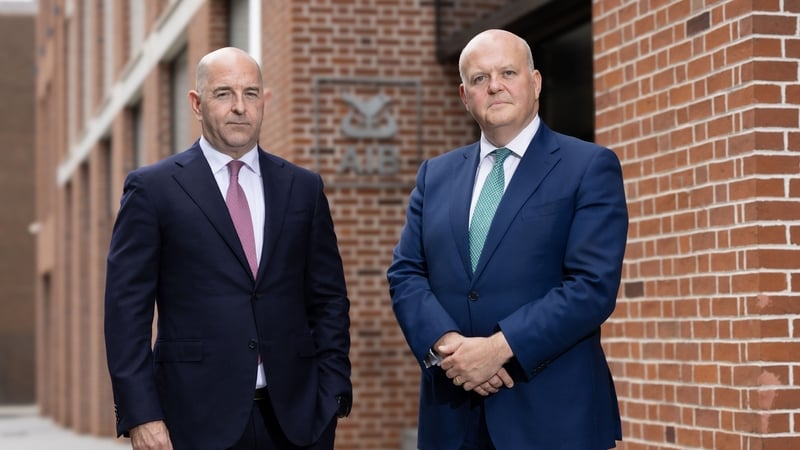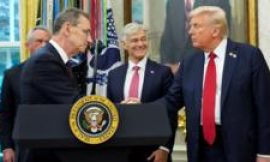AIB has reported lower after tax profits and income for the first half of 2025 – its first set of results since returning to full private ownership in June.
It also said it expects slower loan growth this year due to subdued lending to Irish small businesses and a paring back of financing US renewable energy projects, but repeated its forecast for growth to pick back up in 2026 and 2027.
Its shares moved lower in Dublin trade today.
AIB said its profit after tax fell by 16% to €927m from €1.1 billion the same time last year, while its total income decreased by 10% to €2.232 billion on the back of lower interest rates.
AIB also today announced the resumption of an interim dividend of 12.328 cent per share.
The bank said its net interest margin eased to 2.78% from 3.24% in the first half of last year.
Total new lending for the six month period rose by 9% to €6.9 billion from €6.3 billion last year and AIB noted that first time buyers remain the key driver of activity in the mortgage market here.
AIB said its new mortgage lending in Ireland was up 4% to €1.9 billion, reflecting a mortgage market share of 32%.
We need your consent to load this rte-player contentWe use rte-player to manage extra content that can set cookies on your device and collect data about your activity. Please review their details and accept them to load the content.Manage Preferences
Personal lending in Ireland rose by 3% to €0.7 billion, on the back of an increase in consumer credit demand and its digital offering with 87% of personal loan applications now completed online.
It noted that new lending to SMEs here remained relatively “stable” at €0.8 billion with 66% of small business loans originated on its new online business loan platform.
Meanwhile, new lending in its Capital Markets business rose by 12% to €2.2 billion with the growth in new lending driven by corporate lending and some recovery in real estate new lending from a low previous year period.
AIB said that “green” and transition lending of €2.5 billion accounted for 36% of new lending with €19.1 billion deployed since 2019 as its continues to support customers transition to a more sustainable future.
It noted that green mortgages represented 58% of new mortgage lending, up from 50% the same time last year.
The bank said its asset quality remains resilient, adding that it continues to carefully manage its loan book. Non-performing loans were unchanged at €2 billion or 2.8% of gross loans at the end of June, unchanged from the end of December.

Colin Hunt, the chief executive of AIB Group, said the bank delivered another “strong performance” as it continues to perform well in a resilient Irish economy against a backdrop of macroeconomic and geopolitical uncertainty.
“New lending was up €600m to €6.9 billion, due to growth in mortgages, corporate and personal lending,” he noted.
“Our return on tangible equity was 21.4% and with our robust capital position, today we are pleased to announce an interim ordinary dividend payment of €263m,” the CEO said.
“June 2025 marked the milestone of AIB returning to full private ownership and we remain committed to delivering for our shareholders,” he said.
“We also remain committed to supporting the Irish economy and society as we continue to implement our strategy at pace through our strategic priorities of putting our 3.35 million customers first, further greening our business and achieving greater operational efficiency and resilience,” Mr Hunt added.
The bank had expected a 5% increase in customer loans this year, but cut that to 3% after growth moderated in the first half. It said it still expects compound annual growth of 5% over the next two years.
AIB has positioned lending to large-scale renewable energy and infrastructure projects as a strategic growth area and targeted the US as a major growth area.
But US President Donald Trump’s sweeping tax and spending law, passed last month, accelerates by several years the phase-out of tax credits for wind and solar projects.
AIB finance chief Donal Galvin said the bank “read the mood music” and had already pared back its expectations for activity in the US in the first half. It will look to invest in solar, but wind projects no longer look feasible, he said.
Instead, the bank will look to pivot to projects in mainland Europe, Ireland and Britain, a market Donal Galvin said was really active but very competitive.
He added that he expects to see a pick up in small and medium-sized business lending in Ireland following Sunday’s US-European Union deal on tariffs.
“The worst-case scenario has been avoided so at least now they have a reasonable amount of certainty to push ahead with their business plans,” Donal Galvin told Reuters.
Just weeks after returning to full private ownership AIB announced changes to its hybrid working policy that requires staff to work in an office-based location for a minimum of three days a week.
The Financial Services Union (FSU) described the changes as regressive, short sighted and without justification, while Labour’s Finance Spokesperson Ged Nash said the move was “unacceptable behaviour from one of Ireland’s pillar banks.”
“Without any engagement with staff or the Financial Services Union, AIB has imposed a policy by way of diktat that will drag workers back to their designated office three days a week with no flexibility,” said
When asked if workers had been consulted, Mr Hunt told RTE’s Morning Ireland the decision was made by the executive team that he leads.
“It was communicated very quickly to our colleagues. We did want to give plenty of notice that this change was coming into effect and we gave six months notice of it,” he said.
Mr Hunt said he wanted to assure his colleagues that hybrid working is here to stay and these changes impact one of three groups within the bank.
“We’ve asked the third group, people who currently work from home three days a week, we’ve asked them to work from home two days a week going forward from January 1,” said Mr Hunt.
“I realise that’s a big change, that’s why we’re giving six months notice and it won’t be brought into a full effect until January 1 next year,” he said.
“We’re doing it because we believe that all of our colleagues benefit from spending time with their own teams, I think it leads to better collaboration, better connection, better innovation and ultimately is a positive for our customers, the economy and the communities that we that we serve,” he said.
“But we do recognise the benefits of structured hybrid working and we are committed to continuing to enable it,” he added.




